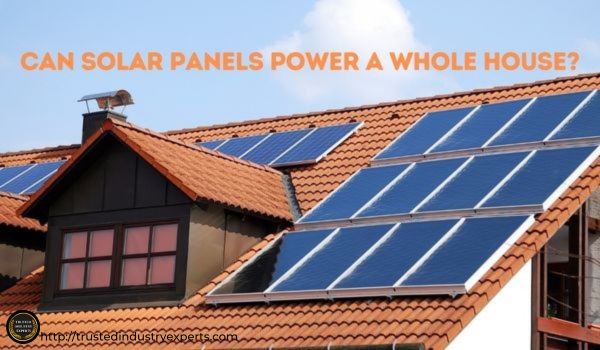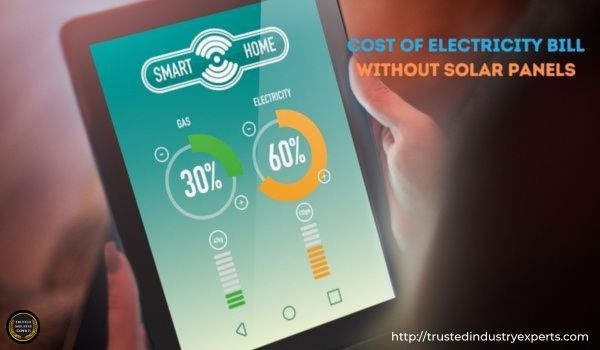
Can Solar Panels Power a Whole House?
Solar energy is becoming increasingly popular as a source of renewable and clean energy. The ability to generate electricity using solar panels is one of the key reasons behind its growing popularity. But, one of the questions that many homeowners have is whether solar panels can power a whole house or not.
The answer is yes! Solar panels can indeed power a whole house. With the right solar panel systems in place, you could power your entire home with clean, renewable energy. Solar system come in various sizes that are designed to meet different needs, depending on the size and shape of your home.
Solar Panels can generate enough electricity to power a whole house, depending on the amount of direct sunlight available. It uses photovoltaic cells that take sunlight and convert it into usable electricity for homes. With a well designed system, one can even store up some of the electricity generated for later use. This makes solar an even more attractive to homeowners benefiting decrease of electricity cost.
In this article, we will explore the factors that determine whether solar panels can power a whole house, including the size of the solar panel system, the energy consumption of the house, and the local climate conditions.
How Solar Panels Generate Electricity
Solar panels generate electricity by converting the energy from the sun into direct current (DC) electricity. The DC electricity is then passed through an inverter which converts it into alternating current (AC) electricity, which is the type of electricity that is used in homes.
The amount of electricity that can be generated by a solar panel system depends on several factors, including the size of the system, the type of solar panels used, and the efficiency of the inverter.
How many solar panels: Number Solar Panels entire Household
Solar panels are a fantastic investment for those looking to reduce their energy bills and become greener in their practices. One important step in installing solar panels is determining how many panels you will need is understanding how the technology works, which includes familiarizing yourself with how they produce power, how much power they generate at peak efficiency, how solar panels work and how long solar panels are expected to last.
There is no one-size-fits-all answer to how many solar panel configurations one should install in an entire household; it ultimately comes down to taking a data-driven approach that reflects the environment around your home and how that impacts production to power your whole house.
That being said, there are lots of resources available to help you make the best choice when it comes to investing in solar panels for your entire house. By doing some independent research and consulting the professionals, you can find out how many solar panels your individual house needs to reap the benefits of this renewable energy source.
A fully solar powered house is a great way to power your home with clean, renewable energy. With the right home solar system in place, you can generate enough electricity to meet all of your home’s energy consumption needs. The size of the system you need depends on the amount of energy your home uses and how much direct sunlight it receives.
The Size of the Solar Panel System: How much energy needed
The size of the solar panel system is one of the most important factors that determine whether it can power a whole house. A larger solar panel system can generate more electricity, which means that it can power a larger house. However, the size of the solar panel system also depends on the energy consumption of the house, which is the next factor we will discuss.
The solar panel system is an amazing technological device, one designed to provide a sustainable and renewable energy source for homes, businesses, and organizations to give enough energy. It does this through solar cells that capture energy from the sun in solar batteries, storing it for use any time of day or night with enough power using solar batteries. And it does all this at a surprisingly compact size.
The size of the solar panel system is not the only factor that determines whether it can power a whole house though; energy usage and electricity usage are also important considerations. In order to calculate how much energy is needed to power your home, you need to determine the average daily electricity usage of your home, as well as its peak energy consumption.
It’s amazing to think that so much power can be packed into such a small area – enough to power entire buildings and streetlights in some cases! Giving enough power usage that can also serve to store extra power. Investing in a solar panel system is a great way to help reduce our reliance on traditional energy sources while also having an environmentally friendly solution available whenever needed.
Solar Panels Cost
When it comes to powering a whole house with solar energy, one of the biggest considerations is the cost. Solar panel installation can be expensive, and the upfront cost might seem too high for some homeowners. However, the long-term savings from lower electric bills can make solar panels a worthwhile investment.
The cost of solar panels will depend on the size and type of system you need. Generally speaking, larger systems that generate more electricity require more solar panels, which can also increase the cost of solar production environment based.
The number of solar panels needed to power a whole house is often determined by calculating the total energy consumption of the house and then determining how many solar panels needed for solar installation to completely power the entire home and how much power stored. Which determines how much power can it transmit to ac power and dc power.
The Energy Consumption of the House
The energy consumption of a house determines how much electricity it needs to function and how much solar production needed. The energy consumption of a house depends on several factors, including the number of appliances and lights, the type of heating and cooling system, and the overall insulation of the house. In general, a larger house with more appliances will have a higher energy consumption than a smaller house with fewer appliances.
Powering Up Household using Solar Panels
Living in a house powered solely by renewable energy is a dream for many eco-conscious people. The energy consumption of the house can be controlled to ensure it runs as efficiently as possible by capitalising on solar production, reducing electricity bills and opting for on-site battery storage.
Completely powering the house with renewables is achievable and allows you to reduce your personal environmental impact while still living comfortably. It also gives an opportunity to educate those around by displaying how accessible alternative energy sources can be. All this makes sustainable alternatives to conventional energy sources much more attainable.
Local Climate Conditions
The local climate conditions also play a role in determining whether a solar panel system can power a whole house. In general, areas with more sun exposure will have a better ability to generate electricity using solar panels.
This means that homeowners in sunny areas are more likely to be able to power their whole house using solar panels than homeowners in areas with less sun exposure.
How much it can generate energy in Climate conditions
Solar panel systems can produce free energy depending on the climate conditions of the location. Regions that receive more sunlight can harness more energy than those that don’t. The amount of direct sunlight a home receives and its energy consumption determine its energy yield.
Local Climate Conditions play a major role in the amount of electricity that can be produced with solar panels. In areas with more sunlight, solar panels are able to produce higher amounts of energy and even access excess electricity which can help reduce electricity costs. Solar panel systems are able to generate as much electricity as is needed for the household.
Cost of Electricity bill Climate conditions:

In sunny areas, installing solar panel systems can lower electricity bills by producing more energy. Due to the fact that the cost of electricity is heavily influenced by the cumulative effects of temperature fluctuations. This is because households do not have to rely as much on utility companies for their energy needs. Solar panels are able to generate enough electricity to cover a household’s power usage.
Without solar panels
Without the use of solar panels, many households rely on local utility company for their energy needs. Fossil fueled utility companies bear the burden of maintaining and creating costly sources of energy to power their utilities. Unfortunately, these sources mainly rely on fossil fuels.
As a result, electric bill can be quite expensive for those who do not make use of solar panels. By using solar energy systems, homeowners can save amount of money paying utility company charging high cost of bills.
With Solar-Panels
By investing in a solar system for their home, homeowners can decrease their electric bills significantly. Solar electricity panels are able to generate enough electricity to cover a household’s energy usage and power their home.
So Can Solar Panels Power a Whole House?
Based on the factors discussed above, it is possible for solar panels to power a whole house. The size of a solar panel system, energy consumption, and local climate conditions determine the exact answer for each house. This varies depending on the specific circumstances.
To determine whether solar panels can power a whole house, it is best to consult with a professional solar installer. They can provide recommendations on the size of a solar panel system to power the house.
Homeowners can determine if solar panels are feasible based on their home’s energy consumption, local climate, and panel system size. Solar panels have the potential to power an entire house but require evaluation.



